The Buffalo Bills are a professional American football team based in the Buffalo metropolitan area. The Bills compete in the National Football League as a member club of the league's American Football Conference East division. The team plays its home games at Highmark Stadium in Orchard Park, New York. Founded in 1960 as a charter member of the American Football League, they joined the NFL in 1970 following the AFL–NFL merger. The Bills' name is derived from an All-America Football Conference franchise from Buffalo that was in turn named after western frontiersman Buffalo Bill. Drawing much of its fanbase from Western New York, the Bills are the only NFL team that plays home games in that state. The franchise is owned by Terry and Kim Pegula, who purchased the Bills after the death of original owner Ralph Wilson in 2014.
The Bills won consecutive AFL Championships in 1964 and 1965, the only major professional sports championships from a team representing Buffalo. After joining the NFL, they struggled heavily during the 1970s before they became perennial postseason contenders during the late 1980s to the late 1990s. Their greatest success occurred between 1990 and 1993 when they appeared in a record four consecutive Super Bowls; an accomplishment often overshadowed by them losing each game. From the early 2000s to the mid-2010s, the Bills endured the longest playoff drought of 17 years in the four major North American professional sports, making them the last franchise in the four leagues to qualify for the postseason in the 21st century. They returned to consistent postseason contention by the late 2010s, although the Bills have not returned to the Super Bowl. Alongside the Minnesota Vikings, their four Super Bowl appearances are the most among NFL franchises that have not won the Super Bowl.
Franchise history
The Bills began competitive play in 1960 as a charter member of the American Football League led by head coach Buster Ramsey and joined the NFL as part of the AFL–NFL merger in 1970. The Bills won two consecutive American Football League titles in 1964 and 1965 with quarterback Jack Kemp and coach Lou Saban, but the club has yet to win a league championship since.
Once the AFL–NFL merger took effect, the Bills became the second NFL team to represent the city; they followed the Buffalo All-Americans, a charter member of the league. Buffalo had been left out of the league since the All-Americans folded in 1929; the Bills were no less than the third professional non-NFL team to compete in the city before the merger, following the Indians/Tigers of the early 1940s and an earlier team named the Bills, originally the Bisons, in the late 1940s in the All-America Football Conference.
Following the AFL–NFL merger, the Bills were generally mediocre in the 1970s, but featured All-Pro running back O. J. Simpson. After being pushed to the brink of failure in the mid-1980s, the collapse of the United States Football League and a series of highly drafted players such as Jim Kelly, Thurman Thomas, Bruce Smith and Darryl Talley allowed the Bills to rebuild into a perennial contender in the late 1980s through the mid-1990s, a period in which the team won four consecutive AFC Championships; the team nevertheless lost all four subsequent Super Bowls, records in both categories that still stand.
The rise of the division rival New England Patriots under Bill Belichick and Tom Brady, along with numerous failed attempts at rebuilding in the 2000s and 2010s, helped prevent the Bills from reaching the playoffs in seventeen consecutive seasons between 2000 and 2016, a 17-year drought that was the longest active playoff drought in all major professional sports at the time. On October 8, 2014, Buffalo Sabres owners Terry and Kim Pegula received unanimous approval to acquire the Bills during the NFL owners' meetings, becoming the second ownership group of the team after team founder Ralph Wilson.
The team's original colors were Honolulu blue, silver and white, and the helmets were silver with no striping. There was no logo on the helmet, which displayed the players' numbers on each side.
In 1962, the standing red bison was designated as the logo and took its place on a white helmet.
The Bills introduced blue pants worn with the white jerseys in 1973, the last year of the standing buffalo helmet. The blue pants remained through 1985. The face mask on the helmet was blue from 1974 through 1986 before changing to white.
The standing bison logo was replaced by a blue charging one with a red slanting stripe streaming from its horn. The newer emblem, which is still the primary one used by the franchise, was designed by aerospace designer Stevens Wright in 1974.
In 1984, the helmet's shell color was changed from white to red, primarily to help Bills quarterback Joe Ferguson distinguish them more readily from three of their division rivals at that time, the Baltimore Colts, the Miami Dolphins, and the New England Patriots, who all also wore white helmets at that point. Ferguson said "Everyone we played had white helmets at that time. Our new head coach Kay Stephenson just wanted to get more of a contrast on the field that may help spot a receiver down the field."
In 2002, under the direction of general manager Tom Donahoe, the Bills' uniforms went through radical changes. A darker shade of blue was introduced as the main jersey color, and nickel gray was introduced as an accent color. Both the blue and white jerseys featured red side panels. The white jerseys included a dark blue shoulder yoke and royal blue numbers. The helmet remained primarily red with one navy blue, two nickel, two royal blue, two white stripes, and white face mask. A new logo, a stylized "B" consisting of two bullets and a more detailed buffalo head on top, was proposed and had been released, but fan backlash led to the team retaining the running bison logo. The helmet logo adopted in 1974—a charging royal blue bison, with a red streak, white horn and eyeball—remained unchanged.
In 2005, the Bills revived the standing bison helmet and uniform of the mid-1960s as a throwback uniform.
The Bills usually wore the all-blue combination at home and the all-white combination on the road when not wearing the throwback uniforms. They stopped wearing blue-on-white after 2006, while the white-on-blue was not worn after 2007.
For the 2011 season, the Bills unveiled a new uniform design, an updated rendition of the 1975–83 design. This change includes a return to the white helmets with "charging buffalo" logo, and a return to royal blue instead of navy. The set initially featured striped socks, but by 2021, the Bills gradually reduced its usage and began wearing either all-white or all-blue hosiery without stripes in most games.
Buffalo sporadically wore white at home in the 1980s, including all eight home games in 1984, but stopped doing so beginning in 1987. On November 6, 2011, against the New York Jets, the Bills wore white at home for the first time since 1986. Since 2011, the Bills have worn white for a home game either with their primary uniform or a throwback set.
The Bills' uniform received minor alterations as part of the league's new uniform contract with Nike. The new Nike uniform was unveiled on April 3, 2012.
On November 12, 2015, the Bills and the New York Jets became the first two teams to participate in the NFL's Color Rush uniform initiative, with Buffalo wearing an all-red combination for the first time in team history. Like the primary uniforms, the set initially had red socks with white and blue stripes, but in 2020, it was replaced with red socks without stripes.
A notable use of the Bills' uniforms outside of football was in the 2018 World Junior Ice Hockey Championships, when the United States men's national junior ice hockey team wore Bills-inspired uniforms in their outdoor game against Team Canada on December 29, 2017.
On April 1, 2021, the team announced they will wear white face masks during the upcoming season and beyond.
Rivalries
The Bills have rivalries with their three AFC East opponents, and also have had historical rivalries with other teams such as the Baltimore/Indianapolis Colts, Kansas City Chiefs, Houston Oilers/Tennessee Titans, Jacksonville Jaguars, and Dallas Cowboys. They also play an annual preseason game against the Detroit Lions.
The Cleveland Browns once shared a rivalry with the Bills' predecessors in the All-America Football Conference. The current teams have a more friendly relationship and have played sporadically since the AFL–NFL merger.
Divisional rivalries
Miami Dolphins
This is often considered Buffalo's most famous rivalry. Though the Bills and Dolphins both originated in the American Football League, the Dolphins did not start playing until 1966 as an expansion team while the Bills were one of the original eight teams. The rivalry first gained prominence when the Dolphins won every match-up against the Bills in the 1970s for an NFL-record 20 straight wins against a single opponent. Fortunes changed in the following decades with the rise of Jim Kelly as Buffalo's franchise quarterback, and though Kelly and Dolphins quarterback Dan Marino shared a competitive rivalry in the 1980s and 1990s, the Bills became dominant in the 1990s. Things have since cooled down after the retirements of Kelly and Marino and the rise of the New England Patriots, but Miami remains a fierce rival of the Bills, coming in second place in a recent poll of Buffalo's primary rival,
New England Patriots
The rivalry with the New England Patriots began when both teams were original franchises in the American Football League prior to the NFL–AFL merger, but did not gain notability until the emergence of New England's Tom Brady in 2001. The teams were very competitive prior to the 2000s. However, the arrival of Patriots quarterback Brady in the early 2000s led to New England dominating the AFC East, including the Bills, for two decades. As a result, t…
Eye-catching new design Buffalo Bills clothing will be the perfect gift for Buffalo Bills fans. Clothing on printed with unique and fancy designs, limited number of products.
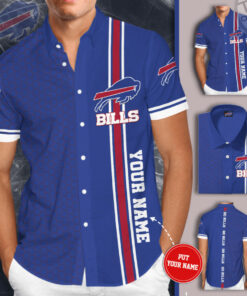
Buffalo Bills Short Sleeve Shirt
$32.95 – $32.98
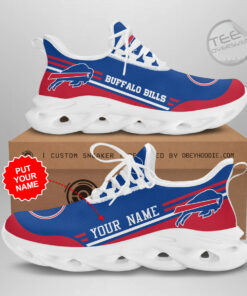
Buffalo Bills Sneaker
$89.95 – $92.95
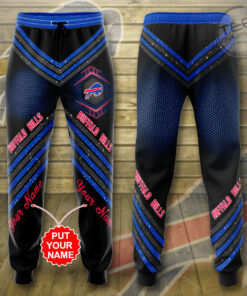
Buffalo Bills Sweatpant
$42.95 – $45.95
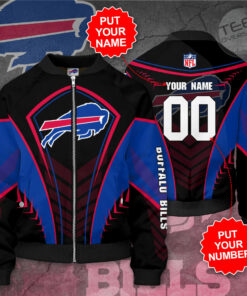
Buffalo Bills Bomber Jacket
$42.95 – $42.98
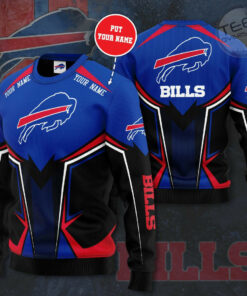
Buffalo Bills Sweatshirt
$42.95 – $42.98
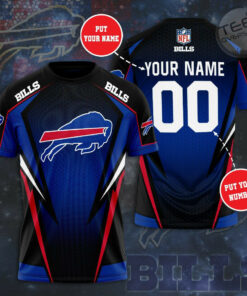
Buffalo Bills T-shirt
$29.95 – $29.98
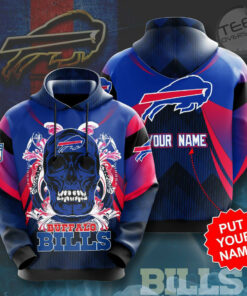
Buffalo Bills Hoodie + Thurman Thomas | Tre’Davious White | Josh Allen
$45.95 – $45.98
The Bills won consecutive AFL Championships in 1964 and 1965, the only major professional sports championships from a team representing Buffalo. After joining the NFL, they struggled heavily during the 1970s before they became perennial postseason contenders during the late 1980s to the late 1990s. Their greatest success occurred between 1990 and 1993 when they appeared in a record four consecutive Super Bowls; an accomplishment often overshadowed by them losing each game. From the early 2000s to the mid-2010s, the Bills endured the longest playoff drought of 17 years in the four major North American professional sports, making them the last franchise in the four leagues to qualify for the postseason in the 21st century. They returned to consistent postseason contention by the late 2010s, although the Bills have not returned to the Super Bowl. Alongside the Minnesota Vikings, their four Super Bowl appearances are the most among NFL franchises that have not won the Super Bowl.
Franchise history
The Bills began competitive play in 1960 as a charter member of the American Football League led by head coach Buster Ramsey and joined the NFL as part of the AFL–NFL merger in 1970. The Bills won two consecutive American Football League titles in 1964 and 1965 with quarterback Jack Kemp and coach Lou Saban, but the club has yet to win a league championship since.
Once the AFL–NFL merger took effect, the Bills became the second NFL team to represent the city; they followed the Buffalo All-Americans, a charter member of the league. Buffalo had been left out of the league since the All-Americans folded in 1929; the Bills were no less than the third professional non-NFL team to compete in the city before the merger, following the Indians/Tigers of the early 1940s and an earlier team named the Bills, originally the Bisons, in the late 1940s in the All-America Football Conference.
Following the AFL–NFL merger, the Bills were generally mediocre in the 1970s, but featured All-Pro running back O. J. Simpson. After being pushed to the brink of failure in the mid-1980s, the collapse of the United States Football League and a series of highly drafted players such as Jim Kelly, Thurman Thomas, Bruce Smith and Darryl Talley allowed the Bills to rebuild into a perennial contender in the late 1980s through the mid-1990s, a period in which the team won four consecutive AFC Championships; the team nevertheless lost all four subsequent Super Bowls, records in both categories that still stand.
The rise of the division rival New England Patriots under Bill Belichick and Tom Brady, along with numerous failed attempts at rebuilding in the 2000s and 2010s, helped prevent the Bills from reaching the playoffs in seventeen consecutive seasons between 2000 and 2016, a 17-year drought that was the longest active playoff drought in all major professional sports at the time. On October 8, 2014, Buffalo Sabres owners Terry and Kim Pegula received unanimous approval to acquire the Bills during the NFL owners' meetings, becoming the second ownership group of the team after team founder Ralph Wilson.
The team's original colors were Honolulu blue, silver and white, and the helmets were silver with no striping. There was no logo on the helmet, which displayed the players' numbers on each side.
In 1962, the standing red bison was designated as the logo and took its place on a white helmet.
The Bills introduced blue pants worn with the white jerseys in 1973, the last year of the standing buffalo helmet. The blue pants remained through 1985. The face mask on the helmet was blue from 1974 through 1986 before changing to white.
The standing bison logo was replaced by a blue charging one with a red slanting stripe streaming from its horn. The newer emblem, which is still the primary one used by the franchise, was designed by aerospace designer Stevens Wright in 1974.
In 1984, the helmet's shell color was changed from white to red, primarily to help Bills quarterback Joe Ferguson distinguish them more readily from three of their division rivals at that time, the Baltimore Colts, the Miami Dolphins, and the New England Patriots, who all also wore white helmets at that point. Ferguson said "Everyone we played had white helmets at that time. Our new head coach Kay Stephenson just wanted to get more of a contrast on the field that may help spot a receiver down the field."
In 2002, under the direction of general manager Tom Donahoe, the Bills' uniforms went through radical changes. A darker shade of blue was introduced as the main jersey color, and nickel gray was introduced as an accent color. Both the blue and white jerseys featured red side panels. The white jerseys included a dark blue shoulder yoke and royal blue numbers. The helmet remained primarily red with one navy blue, two nickel, two royal blue, two white stripes, and white face mask. A new logo, a stylized "B" consisting of two bullets and a more detailed buffalo head on top, was proposed and had been released, but fan backlash led to the team retaining the running bison logo. The helmet logo adopted in 1974—a charging royal blue bison, with a red streak, white horn and eyeball—remained unchanged.
In 2005, the Bills revived the standing bison helmet and uniform of the mid-1960s as a throwback uniform.
The Bills usually wore the all-blue combination at home and the all-white combination on the road when not wearing the throwback uniforms. They stopped wearing blue-on-white after 2006, while the white-on-blue was not worn after 2007.
For the 2011 season, the Bills unveiled a new uniform design, an updated rendition of the 1975–83 design. This change includes a return to the white helmets with "charging buffalo" logo, and a return to royal blue instead of navy. The set initially featured striped socks, but by 2021, the Bills gradually reduced its usage and began wearing either all-white or all-blue hosiery without stripes in most games.
Buffalo sporadically wore white at home in the 1980s, including all eight home games in 1984, but stopped doing so beginning in 1987. On November 6, 2011, against the New York Jets, the Bills wore white at home for the first time since 1986. Since 2011, the Bills have worn white for a home game either with their primary uniform or a throwback set.
The Bills' uniform received minor alterations as part of the league's new uniform contract with Nike. The new Nike uniform was unveiled on April 3, 2012.
On November 12, 2015, the Bills and the New York Jets became the first two teams to participate in the NFL's Color Rush uniform initiative, with Buffalo wearing an all-red combination for the first time in team history. Like the primary uniforms, the set initially had red socks with white and blue stripes, but in 2020, it was replaced with red socks without stripes.
A notable use of the Bills' uniforms outside of football was in the 2018 World Junior Ice Hockey Championships, when the United States men's national junior ice hockey team wore Bills-inspired uniforms in their outdoor game against Team Canada on December 29, 2017.
On April 1, 2021, the team announced they will wear white face masks during the upcoming season and beyond.
Rivalries
The Bills have rivalries with their three AFC East opponents, and also have had historical rivalries with other teams such as the Baltimore/Indianapolis Colts, Kansas City Chiefs, Houston Oilers/Tennessee Titans, Jacksonville Jaguars, and Dallas Cowboys. They also play an annual preseason game against the Detroit Lions.
The Cleveland Browns once shared a rivalry with the Bills' predecessors in the All-America Football Conference. The current teams have a more friendly relationship and have played sporadically since the AFL–NFL merger.
Divisional rivalries
Miami Dolphins
This is often considered Buffalo's most famous rivalry. Though the Bills and Dolphins both originated in the American Football League, the Dolphins did not start playing until 1966 as an expansion team while the Bills were one of the original eight teams. The rivalry first gained prominence when the Dolphins won every match-up against the Bills in the 1970s for an NFL-record 20 straight wins against a single opponent. Fortunes changed in the following decades with the rise of Jim Kelly as Buffalo's franchise quarterback, and though Kelly and Dolphins quarterback Dan Marino shared a competitive rivalry in the 1980s and 1990s, the Bills became dominant in the 1990s. Things have since cooled down after the retirements of Kelly and Marino and the rise of the New England Patriots, but Miami remains a fierce rival of the Bills, coming in second place in a recent poll of Buffalo's primary rival,
New England Patriots
The rivalry with the New England Patriots began when both teams were original franchises in the American Football League prior to the NFL–AFL merger, but did not gain notability until the emergence of New England's Tom Brady in 2001. The teams were very competitive prior to the 2000s. However, the arrival of Patriots quarterback Brady in the early 2000s led to New England dominating the AFC East, including the Bills, for two decades. As a result, t…
Eye-catching new design Buffalo Bills clothing will be the perfect gift for Buffalo Bills fans. Clothing on printed with unique and fancy designs, limited number of products.

Buffalo Bills Short Sleeve Shirt
$32.95 – $32.98

Buffalo Bills Sneaker
$89.95 – $92.95

Buffalo Bills Sweatpant
$42.95 – $45.95

Buffalo Bills Bomber Jacket
$42.95 – $42.98

Buffalo Bills Sweatshirt
$42.95 – $42.98

Buffalo Bills T-shirt
$29.95 – $29.98

Buffalo Bills Hoodie + Thurman Thomas | Tre’Davious White | Josh Allen
$45.95 – $45.98
Nhận xét
Đăng nhận xét